Mattress Buying Guide
Everyone loves to get a great night’s sleep and wake up feeling refreshed. But doing research and shopping around to find the perfect mattress? Not as popular.
We’ve tested and reviewed hundreds of mattresses, so we’re experts at finding the best bed for the best deal. In this guide, we’re sharing our top tips for making the mattress buying experience as smooth and successful as possible.
Bottom Line: How Do You Pick the Right Mattress?
When you’re mattress shopping, first look for a mattress in your budget that will be comfortable and supportive. Other factors, like motion transfer and edge support, can help you narrow down your selection.
How to Shop for a Mattress
Whether you’re a first-time buyer or on a mission to find something better than your current bed, mattress shopping can feel overwhelming. There’s no mattress that’s “one size fits all,” so you really have to sort through the vast sea of mattress options to find the mattress that’s right for you.
However, mattress shopping doesn’t have to be a chore. In fact, it can be quite a rewarding experience if you know how to navigate the process — and we’re here to help.
Here are some shopping tips to consider the next time you go out to shop for a mattress.
Where To Look For Mattresses
You have two main options to explore when shopping for a mattress: online shopping or physical mattress stores.
For convenience, online shopping is king. Aside from being able to order a mattress with a simple click, online shopping also opens the doors to a wider range of options. It allows you to compare different brands, styles, and prices from the comfort of your own home. Many online mattress companies also provide comprehensive product descriptions and customer reviews that can help guide your decision.
On the other hand, physical stores give you the benefit of trying out the mattress before buying, something that’s hard to do when online shopping. You can lie down on the mattress, check the firmness level, and see if it feels comfortable. Mattress stores also have trained personnel that can assist you in finding good deals on mattresses that fit your needs. However, keep in mind that a few minutes in the store might not fully represent how the mattress will feel after a full night’s sleep.
Check Real Reviews
Reviews can provide valuable insight into the real-world performance of a mattress. While marketing materials can highlight the features and benefits, only real customers can give you a true sense of a mattress’s pros and cons. Look for reviews that mention factors such as overall comfort, firmness, motion isolation, durability, and more. However, keep in mind that comfort is subjective, and what works for one person might not work for you.
Look for Mattresses with Trial Periods
A lot of mattress companies offer trial periods for their mattresses — sometimes up to 100 nights or more — where you can bring their mattress home and test it out for yourself. If you realize that the mattress isn’t to your liking, you can usually return it for a full refund. Trial periods take much of the risk out of buying a mattress online and allow you to truly test it out in a way that a brief lie-down in a store can’t match.
Understand What You Need In A Mattress
Finally, and perhaps most importantly, understanding what you need in a mattress is crucial. Consider your sleeping position — side sleepers generally need a softer mattress, while back and stomach sleepers may prefer something more firm. If you have back, hip, or shoulder pain, you should choose a mattress that prioritizes pain and pressure relief for those areas. Also, factor in your personal preference for materials (like memory foam, innerspring, or hybrid), temperature regulation, edge support, and much more. It’s also worth considering any allergies or sensitivities you may have.
If you’re a bit confused right now, don’t worry. In the next section, we’ll teach you all of the important factors to consider and help you find the “best” mattress for your needs and preferences.
Prefer to watch than read? No worries. Here’s our comprehensive video guide on how to shop for the best mattress for you.

What is the Best Mattress?
This is one of the most common questions that we get. It’s a simple question, but the answer is not. The real answer? It depends. The best mattress is the one that prioritizes your needs, preferences, and circumstances. It’s the one that provides the right amount of comfort and support for your body type and sleep habits. It’s a mattress that fits within your budget without compromising quality and durability. Ultimately, the “best” mattress is the mattress you’re most comfortable in — and that’s different for everyone.
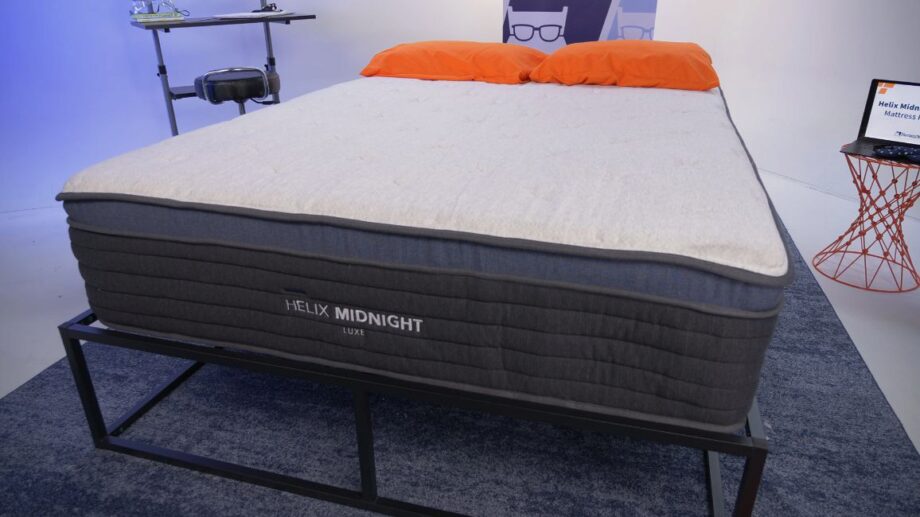
Helix Midnight Luxe Mattress

Product Details
Our Recommendation
Financing Options
Financing options are available for this mattress.
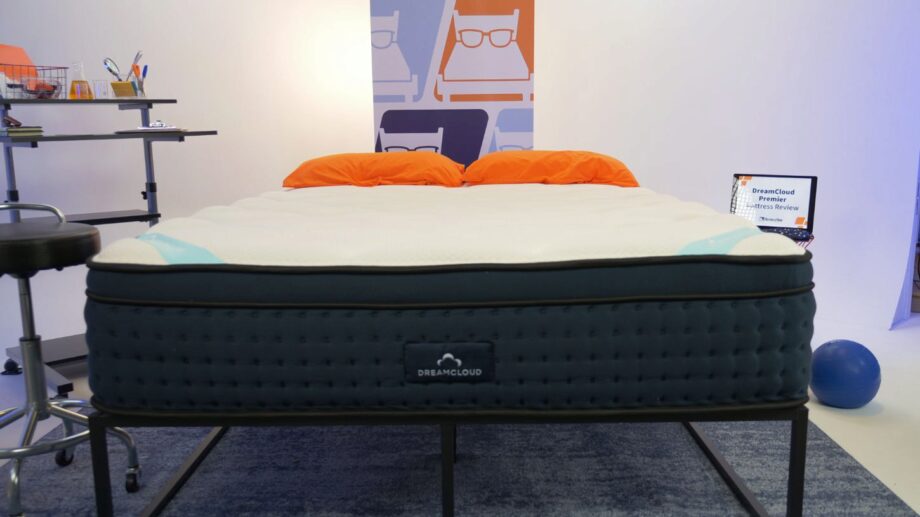
DreamCloud Premier Mattress

Product Details
Our Recommendation
Financing Options
Financing options are available for this mattress.
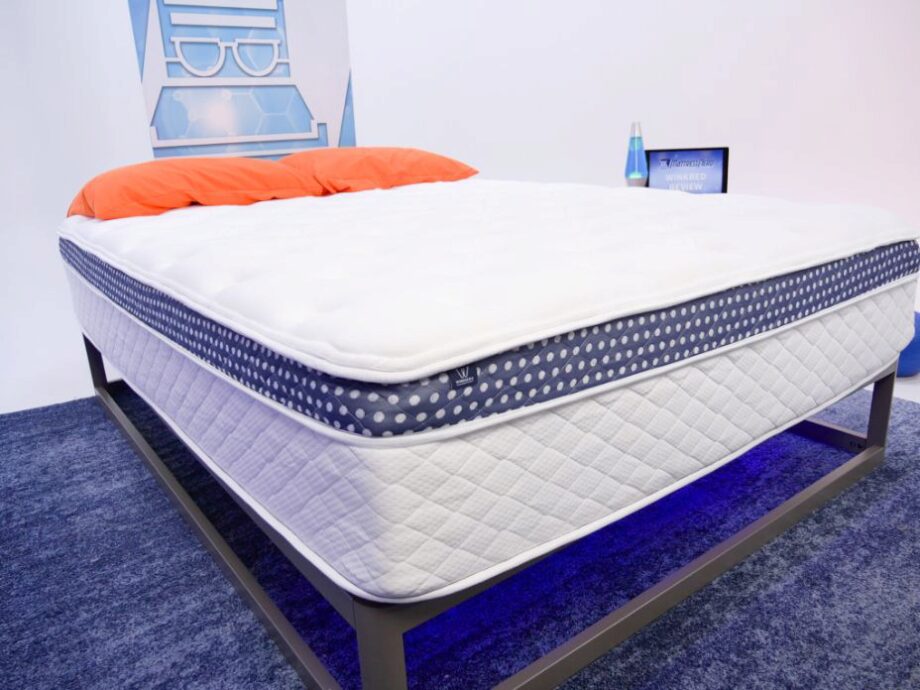
WinkBed Mattress

Product Details
Our Recommendation
Financing Options
Financing options are available for this mattress.
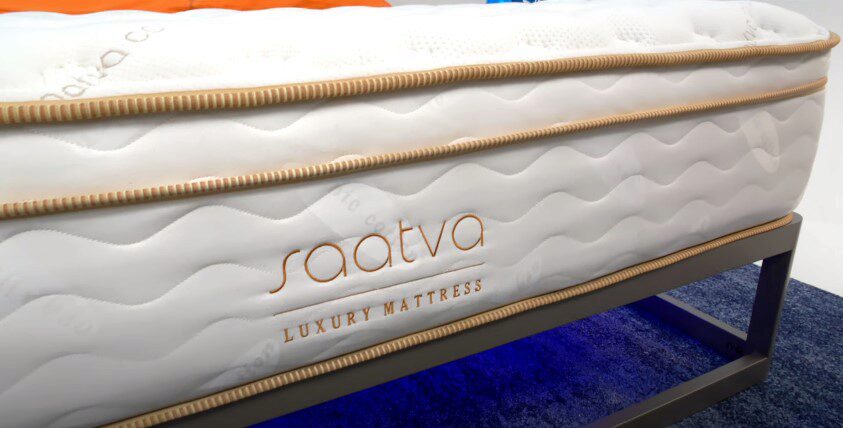
Saatva Mattress

Product Details
Our Recommendation
Financing Options
Financing options are available for this mattress.
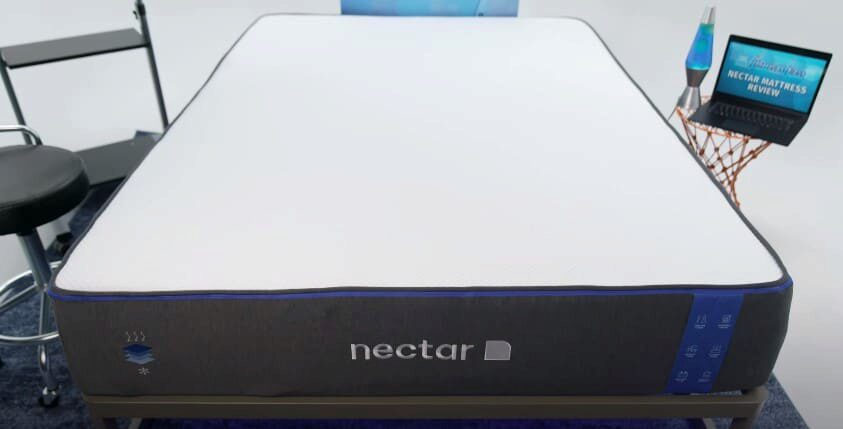
Nectar Mattress

Product Details
Our Recommendation
Financing Options
Financing options are available for this mattress.
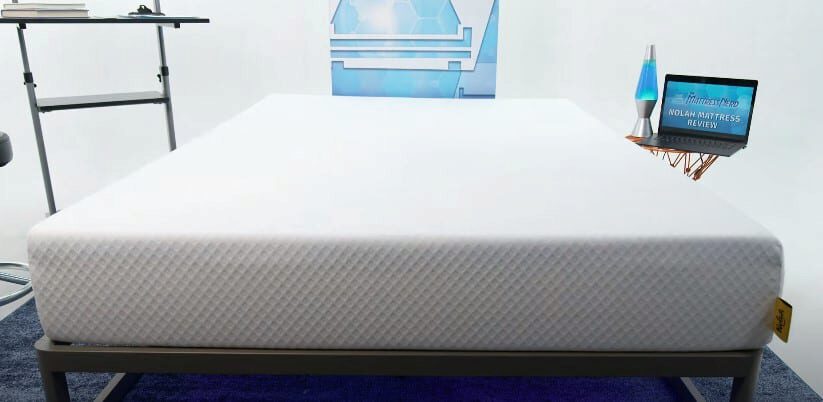
Nolah Original 10″ Mattress

Product Details
Our Recommendation
Financing Options
Financing options are available for this mattress.
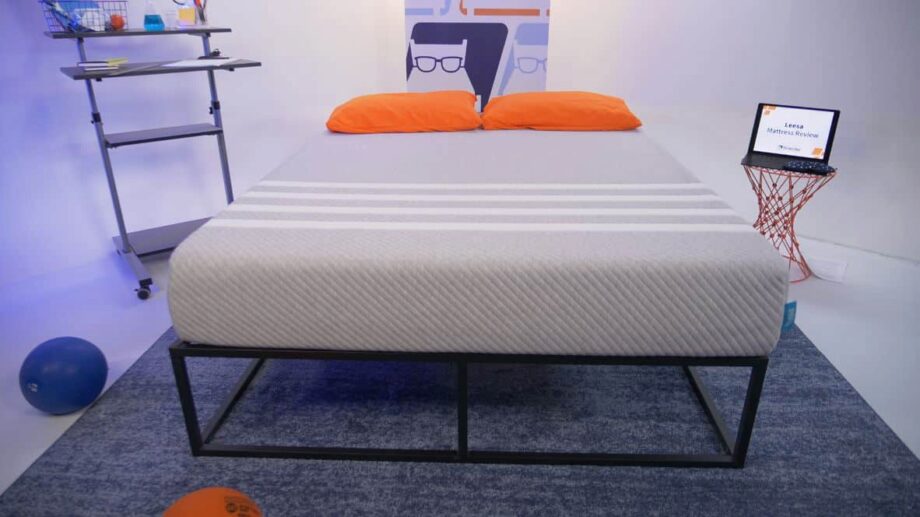
Leesa Original Mattress

Product Details
Our Recommendation
Financing Options
Financing options are available for this mattress.
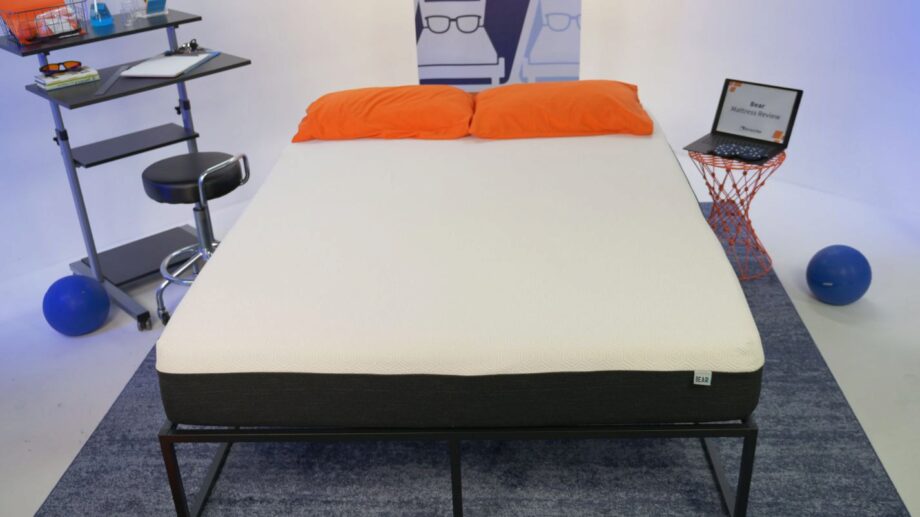
Bear Original Mattress

Product Details
Our Recommendation
Financing Options
Financing options are available for this mattress.
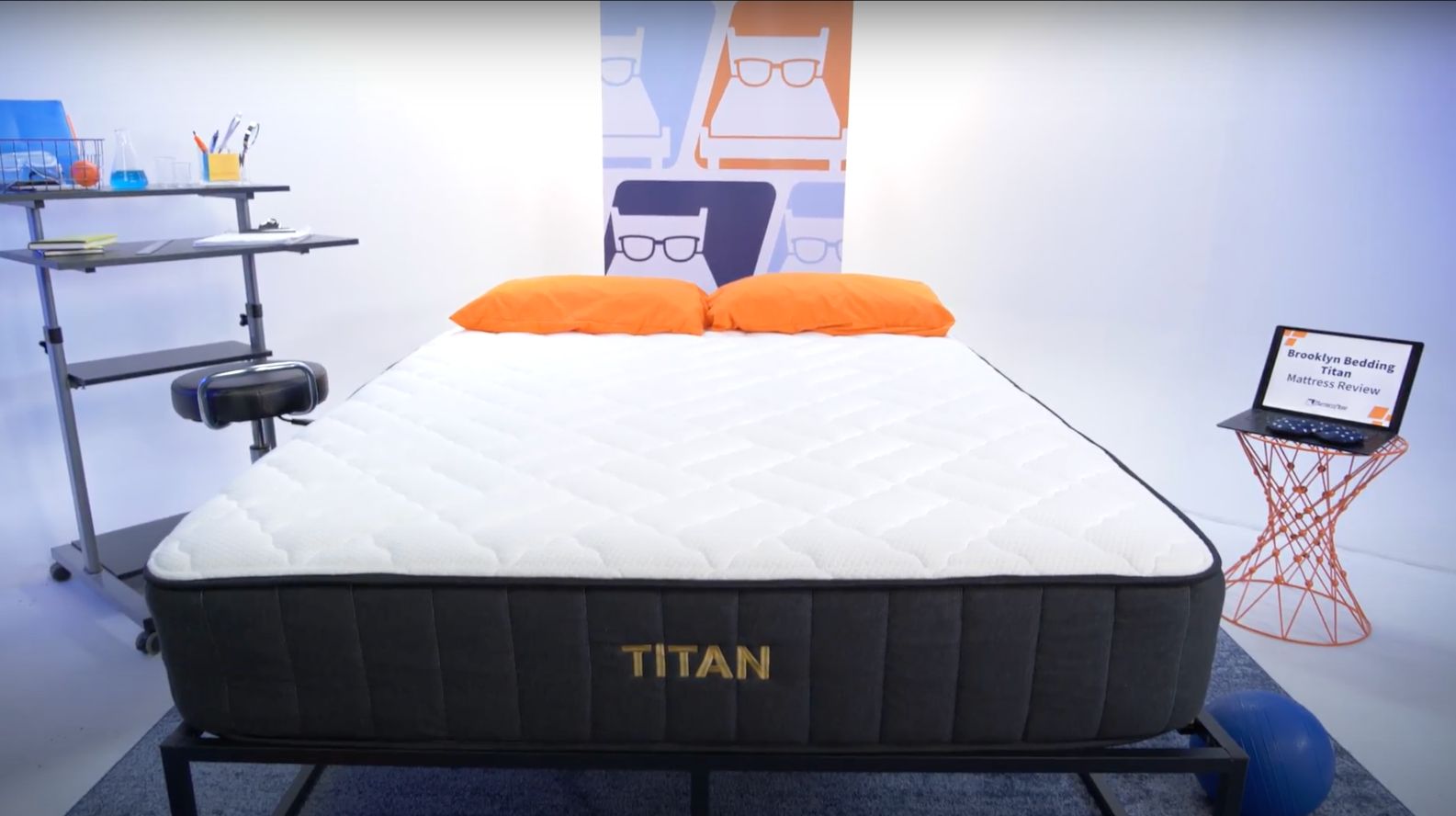
Titan Plus

Product Details
Our Recommendation
Financing Options
Financing options are available for this mattress.
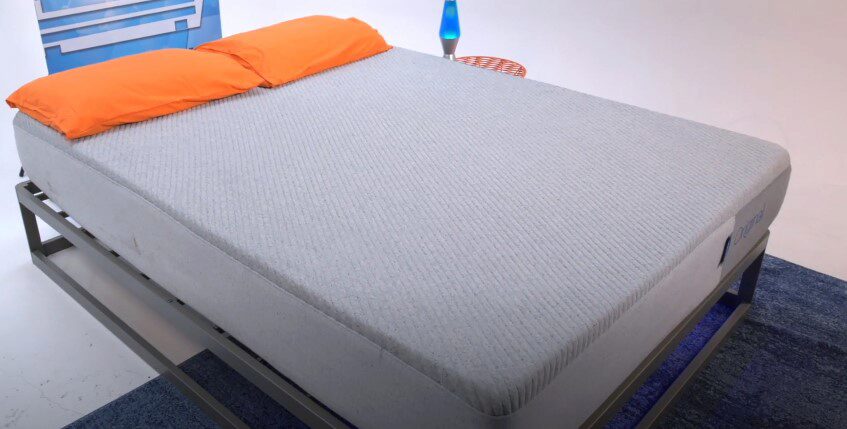
Casper Original Mattress

Product Details
Our Recommendation
Financing Options
Financing options are available for this mattress.
What to Look for in a Mattress
Motion Isolation
Motion isolation is a mattress’s ability to prevent movement from transferring across the bed. If you share a bed with a partner, especially someone who tends to toss and turn or get up frequently during the night, you’ll want a mattress with excellent motion isolation to prevent sleep disturbance.
To test this out, have your partner move around on one side of the bed while you lie still on the other. If you can feel their movements, the mattress might not have strong motion isolation. Also, online mattress review sites usually conduct tests for motion isolation, so look for those as well.
Pressure Relief
Pressure relief refers to how well a mattress can distribute your body weight evenly and prevent pressure points from forming in areas like your hips, shoulders, and lower back. Finding a mattress that provides proper pressure relief for your preferred sleeping position and body type can help prevent pains and aches from worsening or developing in the first place.

To test for pressure relief, pay attention to how it conforms to your body and keeps your spine in proper alignment. You should feel supported and comfortable, with no single point bearing more weight than another. If you can lie on the mattress for several minutes without feeling discomfort, that’s a good sign. Again, online reviews can be a great resource for this, especially from people with similar body types and sleeping styles to you.
Ease of Movement
This is exactly what you think it is — it’s how responsive or easy it is to move around on the mattress. It’s an important factor to consider, especially if you’re shopping for a senior or someone with mobility issues. While preference for materials should be considered, keep in mind that some materials are harder to move around on. If you change positions frequently throughout the night, choose a mattress that doesn’t impede your movement and disturb your sleep.
Testing this out is simple. Try sitting up, rolling over, and getting out of bed. If any of these actions feel difficult or awkward, it might not be the right mattress for you.
Edge Support
Edge support is how much weight your mattress’s edges can handle before sagging or losing its structure. Good edge support allows you to sit or sleep near the edge without feeling like you’re going to slide off. If you have a larger body type or sleep with a partner, get a mattress with good edge support to utilize the full surface of your mattress.
Sit or lie down near the perimeter of your mattress. You should feel just as supported as when you’re lying down on the mattress center. If you feel like you’re going to fall off, then it’s probably a sign that it lacks edge support.
Temperature Control
If you sleep hot or live in a warm climate, you’ll definitely want to take note of temperature control if you want optimal comfort. Temperature control is a mattress’s ability to regulate heat, wick moisture away, and keep you comfortable throughout the night. Similar to ease of movement, some materials, like traditional memory foam, are known for retaining heat. Thus, a mattress’s materials and construction play a big role in how well it regulates temperature.
When shopping, look for mattresses that mention cooling technologies, such as gel-infused foam or breathable covers. In a store, feel the mattress with your hand and see if it feels cool to the touch.
Durability
Durability is referring to how long a mattress holds its shape, structure, and materials over a period of time. Since a mattress is a significant investment, you should get a mattress that will maintain its structure, support, and comfort for many years without sagging or developing indentations.
Unlike the other factors, it’s hard to test for durability in a store or during an online trial period. Your best bet is to go for reputable mattress brands that offer long warranties, as well as read reviews from long-term users.
Mattress Types
Memory Foam
One of the most common mattress types, memory foam mattresses are known for their body-conforming qualities, pressure point relief, and support. Some memory foam mattresses also incorporate additional materials, such as cooling gel or copper infusions, to improve temperature regulation or provide other benefits.
In terms of durability, memory foam mattresses generally perform well, with a typical lifespan of around 7 to 10 years. However, the exact lifespan can vary depending on factors such as the quality or density of the foam and how well the mattress is cared for.
- Pros:
- Excellent pressure relief and support
- Great motion isolation for couples
- Can accommodate a wide range of sleep positions
- Cons:
- May sleep hot due to the heat-retaining properties of the foam
- Some sleepers don’t like the hugging or sinking feeling of memory foam
- Can be difficult to move around on due to the contouring effect
Innerspring
Innerspring mattresses are the traditional type of mattress that rely on metal springs or coils for support. The coils are usually made from steel and can come in different types, such as Bonnell, offset, continuous, or pocketed coils. Each of these coil types offers different feels and levels of support. This type of mattress usually features a comfort layer of foam, fiberfill, or other materials to cushion and additional support.

On average, innerspring mattresses have a typical lifespan of around 5-7 years. However, this can vary depending on the quality of the materials and construction.
- Pros:
- Generally less expensive than other types
- Offers good support and bounce, making it easy to move around
- Usually doesn’t retain heat, staying cool throughout the night
- Cons:
- May not offer sufficient pressure relief for some sleepers
- Can be noisy due to the springs
- Typically offers less motion isolation, which may disturb a sleeping partner
Hybrid
Hybrid mattresses offer the “best of both worlds” by combining different elements from other mattress types. These mattresses usually have a supportive coil base like an innerspring mattress, topped with a layer or two of foam or other materials for comfort. Some hybrid mattresses have extra features, such as zoned support or cooling technologies, to enhance your sleeping experience.
Hybrid mattresses are generally quite durable, with a lifespan of around 7-10 years, depending on factors such as the quality of the materials and construction.
- Pros:
- Offers a balance of support and pressure relief
- Good motion isolation for couples
- Excels at temperature regulation due to the airflow through the coils
- Cons:
- Can be expensive
- Can be heavy and difficult to move
- Some sleepers may not like the balanced feel
Latex
Latex mattresses are made from either natural or synthetic rubber, but they’re usually known for their eco-friendliness, especially when the latex is naturally sourced. Latex offers a soft, contouring feel similar to memory foam but with the added benefits of being more responsive and bouncy. There’s a lot less sinking in latex than in memory foam, so memory foam lovers looking for more pressure relief and responsiveness usually turn to latex mattresses.
Latex mattresses are some of the most durable on the market, with a typical lifespan of around 8 to 12 years or longer with good care.
- Pros:
- Long lifespan and excellent durability
- Good balance of support and pressure relief
- Naturally hypoallergenic and resistant to dust mites and mold
- Cons:
- Can be expensive, especially for natural and organic mattresses
- May feel too firm for some sleepers, particularly side sleepers
- Some people may be allergic to latex
Mattress Firmness
Mattress firmness is one of the first things you consider when mattress shopping, as it significantly affects how comfortable and supportive the mattress feels to you. Personal preference aside, the mattress firmness should suit your body type and sleeping position to ensure you get proper support and comfort for a good night’s sleep.
Back Sleepers
For back sleepers, a medium-firm to firm mattress should offer a good mix of support and contouring. This mattress firmness level should be enough to maintain proper spinal alignment while offering adequate cushioning for the lower back to prevent excessive sinkage, which could lead to back pain.
Fortunately, all mattress types can accommodate back sleepers. Memory foam mattresses can mold to the shape of your body and provide relief for common pressure points, while latex mattresses offer something similar but with a more responsive feel. If you prioritize cooling, hybrid mattresses should offer a similar level of support and comfort, plus the breathability of coils.
Lightweight back sleepers will probably prefer a medium mattress, while heavier back sleepers will likely need a firmer mattress to prevent excessive sinkage.
Side Sleepers
Side sleepers will probably feel most comfortable sleeping on a medium to medium-soft mattress. At these firmness levels, the mattress can provide ample cushioning at the shoulders and hips — the two main pressure points of concern for most side sleepers. A mattress that’s too firm can cause discomfort and develop issues like shoulder or hip pain, which ultimately leads to poor sleep quality. On the other hand, too soft of a mattress may not be able to provide the necessary support for the back, leading to spinal misalignment.
Generally, memory foam or hybrid mattresses work well for most side sleepers. Memory foam offers great pressure relief while contouring closely to the body’s natural curves, while hybrid mattresses offer the bounce and support of coils and the pressure-relieving comfort of foam or latex on top.
Stomach Sleepers
Stomach sleepers will need firmer mattresses that can support their hips and prevent them from dipping too low and causing spinal misalignment. The torso carries a significant amount of body weight, so a mattress that’s too soft will probably cause them discomfort and pain. A medium-firm to firm mattress will do the trick, as it can provide the needed support to keep the spine in healthy alignment.
Innerspring and hybrid mattresses are often a good choice for stomach sleepers, as they offer solid support with a bit of conforming for comfort. Heavier sleepers may need a firmer mattress for proper support, while lighter individuals might be comfortable on a medium-firm mattress.
People With Shoulder Pain
If you’re experiencing shoulder pain, we recommend getting a medium-soft to medium-firm mattress, depending on your sleeping position and body type. People with shoulder pain need a mattress that offers excellent pressure relief to cushion the shoulder area, alleviating pressure points. Avoid getting mattresses that are too firm, as they may worsen shoulder pain, especially if you sleep on your side a lot.
Mattresses that excel at relieving shoulder pain are usually memory foam or hybrid mattresses, as they usually have pressure-relieving comfort layers with excellent body-contouring capabilities.
People With Back Pain
Most folks with back pain will benefit from a medium-firm mattress that can offer a good balance of support and comfort, promoting a healthy neutral spine alignment. Also, a medium-firm mattress may provide good pressure relief to prevent pressure build-up around the lower back region. Too soft of a mattress might lack the support necessary to maintain proper spine alignment, while too firm of a mattress could cause pressure build-up and lead to worsened back pain.
It’s also important for people with back pain to consider their sleeping position when choosing a mattress. Side sleepers might need a slightly softer mattress, while back and stomach sleepers usually need a firmer mattress. Memory foam, latex, and hybrid mattresses can be suitable for people with back pain, so it definitely falls more on preference or if they have additional features to improve sleep quality.
People With Hip Pain
People with hip pain will need a mattress that has excellent pressure relief for pressure points near the hip region. Usually, a medium to medium-firm mattress often works well, as it can provide the necessary support while also cushioning the hips to relieve pressure.
Memory foam and latex mattresses are particularly good at relieving pressure points like the hips. These materials can conform closely to the body, cushioning the hips and promoting spinal alignment. Hybrid mattresses can also work well if they have a thick, pressure-relieving comfort layer. Side sleepers and lighter individuals might prefer a slightly softer mattress, while back and stomach sleepers and heavier individuals might need a firmer mattress.
Lightweight Sleepers (Below 130 lbs)
Because of their lighter weight, lightweight sleepers don’t sink too much into the bed, so they’re best suited to softer mattresses around the medium-soft to medium range. A mattress that’s too firm won’t be able to relieve pressure points properly, which could lead to discomfort and even pain.
As for the mattress type, lightweight sleepers just need to choose based on their preferences and needs. But generally, those who sleep on their sides may need a soft to medium-soft mattress, while back and stomach sleepers may require a medium-soft to medium mattress.
Average-weight Sleepers (Between 130 – 230 lbs)
Most mattresses are designed to cater to average-weight sleepers, so they probably won’t have trouble shopping for one. Generally, though, they’ll sleep comfortably on medium to medium-firm mattresses that strike a balance between support and comfort.
Any type of mattress—memory foam, latex, hybrid, or innerspring—can work well for average-weight sleepers, provided it has the right firmness level. The choice between these types usually comes down to personal preference and specific needs.
Heavyweight Sleepers (Above 230 lbs)
Heavyweight sleepers tend to exert more pressure on the mattress, so they’d need a firm mattress that can support their weight to prevent excess sinkage and maintain good spinal alignment. For that, we recommend medium-firm to firm mattresses with thick profiles (more than 10”) or support systems.
Aside from support, heavyweight sleepers should also look for a mattress that can provide adequate pressure relief, depending on your sleeping position. A mattress that’s too firm may lead to pressure points and discomfort. So, a delicate balance between firmness for support and softness for comfort is necessary. Reinforced edges can also prevent sagging and make it easier to get in and out of bed.
Innerspring and hybrid mattresses usually have supportive and durable coil layers that can work well for heavier folks. Since they have coil layers, they can also provide cooling for heavyweight sleepers since they tend to sleep hotter than others. However, high-density foam and latex mattresses can also work as long as they’re on the firmer side.
How Much Should You Spend on a Mattress?
Mattresses can range from a couple of hundred dollars to thousands of dollars. It’s easy to think that the “best” mattress is the newest and most expensive mattress model, but that simply isn’t true. You can definitely find a mattress that checks all of your boxes and fits within your budget. The first step to doing that is to formulate a budget for your mattress and searching for mattresses within that price range.
But before we a bit more in-depth on mattress price ranges, here are some tips to consider when choosing a budget for your mattress.
- Assess your needs: The right mattress for you depends on your specific needs. Factors to consider include, your preferred sleeping position, aches and pains, your weight, whether you sleep hot or cold, and others.
- Account for health concerns: If you have specific health concerns, such as chronic back pain or allergies, it may be worth investing in a mattress designed to cater to these needs.
- Consider durability: More durable mattresses may be more expensive upfront, but they won’t need to be replaced as quickly. Investing in a durable mattress, so you’ll save money in the long run.
- Check for warranty: For your peace of mind, choose a mattress from a reputable brand that offers a good, comprehensive warranty. A good warranty protects your mattress investment and is often worth spending a bit more for.
- Price doesn’t always mean quality: A lot of mattress shoppers fall into the trap of thinking that a bigger price tag is equivalent to higher quality. Remember, the most expensive mattress isn’t necessarily the best one, and doing good research before buying can help you get the best deal.
With that out of the way, let’s talk about the mattress price ranges and what to expect.
Cheap Mattresses ($100 to $500):
At this price range, you’ll find mostly basic innerspring and memory foam mattresses. These mattresses usually have simple designs and use regular materials without extra features. And so, their lifespan and comfort level may be inferior compared to more expensive mattresses. However, if you’re shopping for a guest room, a child’s room, or for temporary use, these mattresses can be adequate and budget-friendly options.
When shopping in this price range, keep in mind that the longevity of the mattress may be compromised. This is because cheaper mattresses often use lower-quality materials that aren’t as durable as those found in pricier mattresses. Cheap mattresses may also have thinner mattress profiles — and consequently, thinner comfort layers — which could affect the comfort level, as you’re likely to feel the support layers underneath.
Affordable Mattresses ($500 to $1,000):
As you move into the $500 to $1,000 price range, you start to see an increase in the quality of materials and design. Mattresses in this price range use better-quality foam or more robust innerspring systems, which may provide better comfort and support.
However, mattresses at this price range don’t really have premium features that come with higher-end models. Still, you can find some good “bed in a box” mattresses that can offer solid performance, providing a good balance of comfort, support, pressure relief, and durability at an affordable price.
Average-Priced Mattresses ($1,000 to $2,000):
This is where you start to see mattresses with higher-end materials, more sophisticated designs, and extra features. For example, mattresses in this price range usually feature high-density memory foam, pocketed coils, extra cooling features, and more.
Average-priced mattresses also offer better durability, striking a balance between quality and price, making them popular choices for the average sleeper.
Premium or Luxury Mattresses ($2,000 and above):
Premium or luxury mattresses usually start at around $2,000 and can go up into the thousands. At this range, expect mattresses that use the highest quality materials and sophisticated designs. These might include organic latex, luxury memory foam, advanced cooling systems, and unique coil systems.
These mattresses often have the longest lifespans and come with extensive warranties. They’re designed to offer the ultimate in comfort and support and often include features targeted at specific sleep needs, like targeted support for pain relief or advanced cooling for hot sleepers.
Other Considerations
Aside from certain physical attributes, there are other factors to consider when mattress shopping to make sure that you’re getting your money’s worth.
Sleep Trial
If you want to try out a mattress but you’re not sure if it’s worth your money, look for a mattress with a sleep trial. A sleep trial is a period during which you can test a new mattress at home to ensure it’s the right fit for you. This period can last anywhere from a few weeks to an entire year, depending on the company’s policies. Before the sleep trial ends, you can return the mattress for a full refund if it doesn’t meet your needs or expectations.
Lying down on a mattress in a store for a few minutes isn’t enough to get the full feel of it, as our bodies take some time to adjust to a new mattress. Also, it’s not uncommon to feel a bit uncomfortable during the first few nights with your mattress, so you really need to spend a few weeks with your new mattress to see if it’s a genuinely good fit for you.
Sleep trials help with this since they allow you to fully test the capabilities of your mattress without risking your hard-earned money.
To find out about a company’s sleep trial, check their website or contact their customer service team. Details about the length of the sleep trial and any conditions or fees associated with returns should be clearly stated.
Warranty
A warranty is the mattress company’s promise to repair or replace your mattress if it has any defect. Warranties can range from a few years to a lifetime, usually covering defects like sagging, manufacturing flaws, broken coil wires, and others. For example, if your mattress starts to sag noticeably after just a few years, a good warranty would mean that the manufacturer would repair or replace it.
Mattress companies that are confident with their products will offer a solid warranty. You should be able to know a mattress’s warranty on the company’s website or on the product page. Be sure to read the fine print to understand what is and isn’t covered and what the process is for making a claim.
Shipping
Shipping involves the method and cost of getting the mattress from the warehouse to your home. Most mattress companies offer free shipping, while others charge a fee, especially if you’re shipping to non-contiguous U.S. states (Alaska and Hawaii) or to a different country.
Knowing the shipping terms is important since it can add a significant amount to your total purchase. Many “bed-in-a-box” companies compress and roll their mattresses to ship them in a box, which saves on shipping. On the other hand, some companies offer white glove delivery, where they’ll set up your new mattress and remove your old one, which can be a huge convenience but at a steeper cost.
You can find information on the shipping on the company’s website, the mattress product page, or by contacting their customer service. They should provide clear information about shipping costs, methods, and any additional services like white glove delivery or old mattress removal.
Return Policy
Often tied to sleep trials, return policies outline the process for returning a mattress. These should specify the condition the mattress needs to be in for a return, any associated fees, and the process for scheduling a return.
Knowing that a mattress company offers hassle-free return policies can provide you with peace of mind since you can easily return the mattress if it doesn’t work out. It’s especially important for online mattress companies where you can’t test the mattress before purchasing.
You can usually find return policy details on the company’s website or by contacting their customer service. It should be straightforward to understand and free of any hidden fees or complications.
Customer Service Support
At some point in our lives, we’ve probably dealt with bad, headache-inducing customer service and never want to go through it again. Customer service support involves how a company assists customers before, during, and after their purchase. This includes answering questions, helping with delivery or warranty claims, and resolving any problems or issues.
A mattress company with excellent customer service can make the difference between a smooth ownership experience and a stressful one. If you encounter an issue with your mattress, it’s reassuring to know that a helpful and responsive customer service team is there to assist you.
To get a sense of a company’s customer service, look for reviews online or contact them with any questions or concerns. You should expect prompt, helpful, and friendly service from any company you’re considering for a major purchase like a mattress.
When is the Best Time to Buy a Mattress?
Holidays
Holidays are prime time for mattress sales. Retailers slash prices to entice buyers, fully knowing that people have time off work and are ready to shop to find gifts or scope out for good deals.
For instance, Presidents Day, Memorial Day, Fourth of July, Labor Day, and Black Friday are renowned for their mattress deals. You’ll often find discounts of 20-30%, freebies with a mattress purchase, and even bundled deals, including pillows and sheets.
Shopping Tips for Holiday Sales
- Start researching early to familiarize yourself with regular prices, so you can spot a good deal when you see one.
- Read the fine print. Some sales may have exceptions or require a minimum spend.
- Compare prices across different retailers. Sometimes a store may offer a better deal than the mattress company itself.
- Don’t just check physical stores. Many online mattress companies also offer holiday sales.
Before New Products Roll Out (May)
Mattress companies usually roll out new products in June, so May often becomes a hotbed for sales as companies try to clear out the old inventory to make room for the new models. During this time, you can find substantial discounts, sometimes even on top-rated mattresses.
Shopping Tips for May Sales
- Don’t feel pressured to buy the latest model. The older models can still perform well relative to the new model.
- Do your research to ensure the discounted mattress fits your needs.
- Check return policies. If the mattress is on clearance, make sure returns are still accepted.
- Consider buying floor models, which are the mattresses they have on display. These can be heavily discounted and are usually in like-new condition.
Amazon Prime Day
Amazon Prime Day, usually held in July, offers some of the best deals on mattresses, especially for online brands. During this time, Amazon collaborates with many mattress brands to offer discounts and bundle deals exclusive to Prime members.
Shopping Tips for Amazon Prime Day
- If you’re not an Amazon Prime member, consider signing up for a free trial to access the deals.
- Keep an eye on Lightning Deals. These are short, limited-stock deals that can offer significant savings.
- Read reviews before purchasing. Amazon has a wide user base, so use their experiences to inform your decision.
- Remember to check other retailers. They often hold their sales to compete with Prime Day.
Company Sales
Many mattress companies run their sales, even without a specific holiday or event in mind. These can be clearance sales, anniversary sales, or simply random promotions to boost sales. Companies may offer discounts, free items with purchase, or even free upgrades to a better model.
Shopping tips for company sales
- Sign up for email newsletters from mattress companies. They usually send sale alerts to their mailing list first and sometimes even offer exclusive discounts.
- Follow mattress companies on social media. Many times, they announce sales on their social media channels.
- Check out company websites regularly. Sales are often prominently advertised on their home page.
- Consider reaching out to customer service. They might have information on upcoming sales or even exclusive discounts.
Buying a Mattress Online vs. In-Store
Shopping has come a long way in the digital age, where we can easily search and buy things online with a few simple clicks. However, while some buyers appreciate the convenience of online shopping, others prefer the traditional experience of buying in-store. Each method has its advantages and drawbacks. Let’s break them down:
Online
Pros
- Convenience: You can shop from the comfort of your own home, on your phone or computer, at any time.
- No sales pressure: You can take your time to research and compare products without the pressure of a salesperson hovering behind you.
- Wider variety of options: You have access to a wider array of brands and models online, all at your fingertips.
- Better prices: It takes less money to run a physical mattress store, so some online mattress companies have lower overhead costs, which can result in lower prices for customers.
- Easy comparisons: You can easily compare different brands, models, and prices on the Internet.
- Customer reviews: Online reviews can provide valuable insights from actual users. You can also look up reviews from reputable mattress review sights to get more info.
Cons
- Can’t try before you buy: Unlike in physical stores, you won’t be able to touch, sit on, or lie down on a mattress to test it for comfort and support before purchasing.
- Waiting for delivery: You’ll have to wait for the mattress to be delivered, unlike in-store, where you can take it home the same day. However, some companies do offer same-day delivery.
- Potential for scams: If you’re not online-savvy, you may encounter scam websites selling non-existent mattresses. Take time to verify that you’re buying from a reputable source.
- Shipping issues: Since you have to rely on shipping companies to have your mattress delivered, delays or damages may occur during delivery.
- Returns can be a hassle: Although many companies offer free returns, it can still be a hassle to package and return a mattress.
- Information overload: If you don’t know what to look for, the wide range of mattress options can be overwhelming. (Luckily, you’re reading our guide!)
In-Store
Pros
- Try before you buy: You can get a feel, sit, and lie down on the mattress and get a good gauge of its comfort and support level.
- Personal assistance: Mattress stores will have knowledgeable salespeople who can guide you through the buying process and give you recommendations.
- Take it home immediately: If the mattress is in stock, you can usually take it home the same day.
- Less hassle in returns: If you need to return a mattress, it’s often easier to do it at a physical store.
- In-store financing options: Some stores offer financing options, like installment plans, which might not be available online.
Cons
- Limited selection: Stores carry fewer brands and models than you can find online.
- Higher prices: Physical stores have higher overhead costs, which may be reflected in their prices.
- Sales pressure: Some people might find the presence of a salesperson to be stressful or intrusive.
- Time-consuming: Visiting multiple stores to compare different brands and models can be time-consuming.
- Store hours: You’re limited to shopping during the store’s operating hours.
- Transportation: If you don’t have your own vehicle, getting your new mattress home could be challenging.
Conclusion
Congrats! Now that you’ve reached the end of our guide, you’re now armed with the know-how to make an informed choice on your new mattress. Shopping for a mattress is a hard but worthy endeavor since your mattress has a big impact on your health and overall quality of life. Whether you buy online or in-store, prefer memory foam or latex, or require a soft or firm feel, there’s a perfect mattress out there waiting for you — it just takes a little bit of research. Good luck!
Mattress Buying Guides by Age and Lifestyle
As we age and enter new stages of life, our sleep, and what we need to get that sleep, changes. Our bodies change, our lifestyle shifts, and ultimately, our needs in a mattress are altered to accommodate those changes. To find the best mattress for your age and lifestyle, see the following guides.
Mattress Buying Guides by Sleeping Position
Did you know you should consider you sleep position when shopping for a mattress? You should. Bodyweight is distributed differently depending on whether you sleep on your back, stomach, or side. Additionally, the pressure placed on the joints differs based on body position. That’s why we want to help you find the best mattress based on your sleeping position.
Mattress Buying Guides by Type
Some sleepers prefer a specific type of mattress based on its overall feel. Whether you like the contour of memory foam or the bounce of springs, there is a mattress out there to meet your comfort preferences.
Also, see the best mattresses by…
Mattress Firmness
Desired Qualities
Mattress Shopping Tips
With the introduction of the bed-in-a-box industry to the internet, the way consumers shop for mattresses has been flipped on its head. Now that consumers have the option to buy beds online and try them in the comfort of their own home they no longer have to face the pesky mattress salesman breathing down their neck. But shopping in a brick-and-mortar store is familiar to most people. We don’t want where or how you find your mattress to hinder you from finding the best mattress for you. That’s why we have created the following guides—to help you navigate your mattress search whether you shop in person or from the comfort of your own home.
Navigating the Mattress Buying Journey
General Tips
Mattress Care and Maintenance
You may already own a mattress you love. If you are looking for tips to clean your mattress or prolong its lifespan, see our mattress care and maintenance guides. You may also wonder when you should replace your mattress and how to go about disposing of it. You are in the right place. We cover that too.
Mattress Guide Directory
Best Mattresses By…
Navigating the Mattress Buying Journey
A
Body
Best Mattresses for Plus-Size Sleepers
Best Mattresses for Hot Sleepers
Best Mattress for Fibromyalgia
InPreference-Store
General Mattress Information
Materials and Construction

Loren Bullock
Certified Sleep Science Coach
About Author
Loren is the Lead Mattress Reviewer at Mattress Nerd. She has prioritized sleeping for as long as she can remember, rarely deviating from seven to nine hours each night. As an editor on Mattress Nerd and a Certified Sleep Science Coach, Loren aims to help people achieve optimal sleep health and pick the best sleep accessories for their needs. You can find her testing mattresses, exploring the best sleep hacks, and telling you about her findings on Mattress Nerd’s YouTube channel and on TikTok.
Combination Sleeper
Education & Credentials
- Certified Sleep Science Coach





















